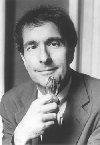| Home
Program Director
Curricula
What's New Page
IT Resources
Tibet Folder
Library Reference Collection
Intelligence
Our Computers
Recommended Links
Contact Us
Guest Book
September 11th
|
|
|
Intelligence, Learning Models, and Theories.
Intelligence is one in the myriad of theories that attempt to describe and classify personality. There are basically two schools of thought on how intelligence affects personality. One proposal is that there exists a central form of intelligence called g. While g is not representative of raw intelligence, g is used to show what sort of central intelligence one possesses in all areas. A good illustration of g can be seen in the following example: Two people take the SAT. They both score a 1400 (out of 1600). One student got a 600 in verbal and an 800 in math. The other got a 600 math and 800 verbal. While these two students are obviously intelligent in different ways, they both would have a high g score. The other theory is, somewhat obviously, that there exist various types of intelligence.
At Satori Dharma Hawai'i, the student is regarded as an intelligent individual who presents a welcome challenge to the program: finding the right learning model and, thus, avoiding the wrong style of teaching.
|
|
|
JEAN PIAGET
Jean Piaget, was a Swiss psychologist known for his research in developmental psychology. He studied under C. G. Jung and Eugen Bleuler in Zurich, and then in Paris at the Sorbonne. There, he worked with Alfred Binet in the administration of intelligence tests to children. In reviewing the tests, Piaget became interested in the types of mistakes children of various ages were likely to make. After returning to Switzerland in 1921, Piaget began to study intensively the reasoning processes of children at various ages. Piaget theorized that cognitive development proceeds in four genetically determined stages that always follow the same sequential order.
|
|
|
C.G. Jung
Carl Gustav Jung developed a personality typology that has become so popular that some people don't realize he did anything else! It begins with the distinction between introversion and extroversion. Introverts are people who prefer their internal world of thoughts, feelings, fantasies, dreams, and so on, while extroverts prefer the external world of things and people and activities. Instructors need to be able to identify not only preferred learning models that can enhance a student's potential but also the individual's personality type. Jung's theories and research are invaluable resources, therefore, in the education and psychology world.
|
 |
Howard Gardner
Howard Gardner is best known for his theory of multiple intelligences, a critique of the notion that there exists one single human intelligence that can be assessed by standard psychometric instruments. The work of Howard Gardner has changed the way people think and work in education, in the arts, in cognitive psychology, and in medicine.
|
|
|


